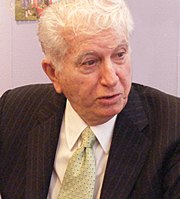| Thomas D'Alesandro | |
|---|---|

| |
| 43rd Mayor of Baltimore | |
In office January 1, 1967 – January 1, 1971 | |
| Preceded by | Theodore McKeldin |
| Succeeded by | William Schaefer |
| Personal details | |
| Born | Thomas Ludwig John D'Alesandro III July 24, 1929 Baltimore, Maryland, U.S. |
| Died | October 20, 2019 (aged 90) Baltimore, Maryland, U.S. |
| Political party | Democratic |
| Spouse(s) | Margie Piracci |
| Children | 5 |
| Military service | |
| Allegiance | United States |
| Service/branch | |
| Years of service | 1952–1955 |
Thomas Ludwig John D'Alesandro III (July 24, 1929 – October 20, 2019) was an American attorney and former politician who was Mayor of Baltimore from 1967 to 1971.[1] He was the brother of Speaker of the U.S. House of Representatives Nancy Pelosi,[2] and son of former Baltimore Mayor Thomas D'Alesandro Jr., who served from 1947 to 1959.[1]
Biography[]
Early life and education[]
D'Alesandro was born in Baltimore to Annunciata (née Lombardi) and Thomas J. D'Alesandro Jr. He was the oldest of six children, of whom his youngest sister Nancy would become the first female Speaker of the U.S. House of Representatives. He attended Loyola College in Baltimore and studied law at the University of Maryland School of Law.[1] In 1952, he married Margaret "Margie" Piracci at the Baltimore Basilica; more than 5,000 people attended the wedding.[3] He served in the US Army from 1952 to 1955.
Career[]
After military service, D'Alesandro entered into politics, becoming president of the Baltimore City Council in 1963.[1] He ran for mayor in 1967 as a Democrat and easily defeated Republican challenger Arthur W. Sherwood, winning all 555 of the city's precincts.[4][5]
As Baltimore's 42nd mayor, he opened new schools, built a new police headquarters and pushed for open housing. D’Alesandro got Baltimoreans to approve an $80 million bond issue to build schools. He devised summer recreation programs — mobile pools, day camps — for city youth. And he laid legislative groundwork for the Inner Harbor development.[6]
D'Alesandro's one term as mayor was dominated by civil unrest and budgetary troubles.[1] In 1968 D'Alesandro ordered the relocation of the East-West Expressway, unstarted since 1941, to be rerouted through the Western Cemetery, then cancelled the project, then implemented a HUD program to finance 475 of the vacant homes abandoned after they were previously condemned to create "homes for the poor." The homes were demolished in 1974, with the Rouse Company creditors abandoning the project.[7][8]
Just four months after D'Alesandro's inauguration, the Baltimore riot of 1968 erupted after the assassination of Martin Luther King Jr., and Maryland Governor Spiro Agnew called National Guard troops in to control the situation.[9] D’Alesandro, who took office vowing to “root out every cause or vestige of discrimination,” remained proud throughout his life of his progressive record on civil rights. As City Council president, he worked with Mayor Theodore McKeldin, a liberal Republican, to eliminate racial barriers in employment, education and other areas. As mayor, he appointed multiple African-Americans to his administration, some of them, such as George Russell, Jr., the city solicitor and member of the Board of Estimates, the first African Americans to hold those positions.[6]
In 1998, Jack Eddinger, Mayor D'Alesandro's former press secretary, wrote in the Baltimore Sun that "Tommy D'Alesandro was Baltimore's first modern mayor. He not only presided over its emergence as a Renaissance City that it is today, but he gave it unmatched leadership. Much of what other mayors get credit for began in those tumultuous four years, from urban design and labor law reform to streamlined governmental administration and the flowering of the vital alliance between the city and the Greater Baltimore Committee." [10]
D'Alesandro would never run for another political office, choosing to go into private law practice. Years later, D'Alesandro insisted that the riots were not the reason that he walked away from politics. He said that the reason was simply that he had five children and his mayoral salary was not sufficient for him to support his family.[4] D'Alesandro died after complications from a stroke at his home in North Baltimore on October 20, 2019.[11] His sister, Speaker Nancy Pelosi said upon his passing "Tommy dedicated his life to our city. A champion of civil rights, he worked tirelessly for all who called Baltimore home. Tommy was a leader of dignity, compassion and extraordinary courage, whose presence radiated hope upon our city during times of struggle and conflict." [12]
References[]
- ↑ 1.0 1.1 1.2 1.3 1.4 Biographical Dictionary of American Mayors, 1820–1980. Westport, CT: Greenwood Press. 1981. [1]
- ↑ "About Rep. Pelosi". Congresswoman Nancy Pelosi official website. Archived from the original on June 1, 2011. https://web.archive.org/web/20110601182522/http://pelosi.house.gov/about/biography.shtml. Retrieved December 20, 2011.
- ↑ Tkacik, Christina. "65 years ago, Tommy and Margie got married in Baltimore's own royal wedding" (in en-US). https://www.baltimoresun.com/features/retro-baltimore/bal-retro-baltimore-65-years-ago-tommy-and-margie-got-married-in-baltimore-s-own-royal-wedding-20170607-story.html.
- ↑ 4.0 4.1 For 30 years, people have wondered how Tommy D'Alesando III, a born winner, could walk away from politics. It wasn't the '68 riot, he insists. Accessed July 1, 2013
- ↑ Olesker, Michael (2018-10-25). "Recalling Old Times with Tommy the Younger" (in en-US). https://www.jmoreliving.com/2018/10/25/recalling-old-times-with-tommy-the-younger/.
- ↑ 6.0 6.1 https://www.baltimoresun.com/obituaries/bs-md-ob-tommy-dalesandro-20191020-dzzetsbbi5cehdiqupcp5slwca-story.html
- ↑ Elfenbein, Jessica; Hollowak, Thomas L.; Nix, Elizabeth. Baltimore '68 : Riots and Rebirth in an American City. p. 62.
- ↑ "Governor O'Malley Breaks Ground on Removal of West Baltimore's 'Highway to Nowhere' MARC Station improvement plan reunites West Baltimore communities". Archived from the original on April 26, 2014. https://web.archive.org/web/20140426065933/http://www.governor.maryland.gov/pressreleases/100910.asp. Retrieved 28 August 2014.
- ↑ "Former Baltimore Mayor Looks Back" (in en). https://www.npr.org/templates/story/story.php?storyId=89427135.
- ↑ https://www.baltimoresun.com/news/bs-xpm-1998-04-19-1998109029-story.html
- ↑ Broadwater, Jean Marbella, Luke. "Former Baltimore Mayor Thomas 'Young Tommy’ D’Alesandro III dies at 90". https://www.baltimoresun.com/obituaries/bs-md-ob-tommy-dalesandro-20191020-dzzetsbbi5cehdiqupcp5slwca-story.html. Retrieved October 20, 2019.
- ↑ Pelosi Statement on the Passing of Thomas D’Alesandro III
The original article can be found at Thomas D'Alesandro III and the edit history here.